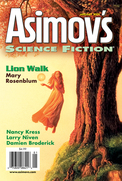
| Editor: | Sheila Williams |
| Issue: | Volume 33, No. 1 |
| ISSN: | 1065-2698 |
| Pages: | 112 |
Robert Silverberg's column this issue on the problems of translation was one of his better ones. His tracing of a mistranslation of a Roman quotation was a worthwhile story in its own right as well as a good illustration of his point. Paul di Filippo's book column was somewhat less obscure and more interesting than average, and James Patrick Kelley offered a mildly interesting update on podcasts.
"Lion Walk" by Mary Rosenblum: This is one of my favorites of Rosenblum's short stories. It follows an administrator and park ranger of a UN-administered wild animal reserve in the central United States, with the twist that it's an attempt to recreate extinct fauna via careful genetic manipulation and breeding programs. The animal inhabitants are, at the time of the story, a mix between the older genes and current wild-caught animals, with the pride and herd leaders still wily veterans of a more modern wildness. The viewpoint character, Tahira, is a similar survivor, tending to identify with the animals.
The focus of the plot is the death of a girl who is caught inside the park and devoured by lions. This sets off public relations fallout, including US resentment at the UN-run reserve, and demands for the putting down of the lion pride. Tahira, meanwhile, is more interested in how the girl got into the park without setting off the security system and the surveillance footage that was replaced by a previously recorded loop. The plot unfolds from deep in her perspective: a tired, persistant, and somewhat elegiac outlook tempered with her own notions of justice and deeply compelling to read. The story moves a bit slowly, but the details, psychological and physical, are rich and rewarding. The ending sparks thoughts about change, history, and perspective, and is quiet but satisfying. This is the best story by Rosenblum I've read yet, which is saying something. (8)
"Passing Perry Crater Base, Time Uncertain" by Larry Niven: Following aliens as they first encounter our solar system and examine records of our lunar activity is an interesting premise. Too bad it's for nothing but another tired guilt trip about the space program. Thankfully it's short, so not much money wasted. (3)
"Bridesicle" by Wil McIntosh: This story idea, in contrast, was unappealing at the start. Cryogenic technology has been mostly perfected, but reviving frozen accident victims is very expensive. Solution: a bizarre variation of a dating service, in which rich (and desperate) people can go to a facility to converse with temporarily-awakened dead people to see if they're worth paying the revival fees for. It's a disturbing and cynical idea that serves as the kernel of a surprisingly warm-hearted and enjoyable story about love and friendship. Much, much better than I expected it to be. (7)
"Five Thousand Light Years from Birdland" by Robert R. Chase: The introduction to this story says the author hopes it's in the spirit of Poul Anderson. I thought he did a good job. The story is an account of first contact in flashbacks amidst the story of a diplomatic mission, where playing it safe turns out to be ill-advised. I liked the unexpectedness of the story and the way that it circles around problems of alien psychology without becoming tedious. Solidly entertaining. (7)
"Messiah Excelsa" by E. Salih: The main problem with this story, in my opinion, is the somewhat strained style of language. I think it was intended to provide a slightly archaic feeling, since the story is set in the time of Stradivarius, but I found it annoying and long-winded. This was exacerbated by the often-lengthy but not particularly effective descriptions. Both are a shame, since once the story finally starts, it's a decent time-travel plot with an unusual focus. The second half of the story is much better than the first, despite drawing on old SF cliches for the ending. (5)
"Unintended Behavior" by Nancy Kress: This is a disturbing short story about a woman caught in a marriage to an insanely over-controlling husband, one who has all the resources of near-future surveillance technology and home automation at his disposal. The creepily plausible effectiveness of his control is somewhat undermined by the predictable path of the plot, but one still can't help but root for the heroine and the human rebellion against the worst uses of technology. (6)
"Uncle Bones" by Damien Broderick: This story tries hard to be a good adventure story with a few twists and a few SFnal ideas, but for me it fell a bit flat. Probably the largest flaw is a matter of personal taste: the protagonist is a boy who acts like the stereotype of a boy and has standard childhood problems such as bullies and an exaggerated fear of social disgrace. This is not a preternaturally intelligent child with any adult understanding of his situation, which is a plus for realism, but I found him profoundly uninteresting and frequently annoying to read about.
The second flaw is the SFnal premise: the ability to rescue people from recent death via nanites that still leave the body in a largely decomposing state. It's basically an SFnal excuse for zombies, who are then mostly played for their gross-out factor. The small bit of social commentary is obvious and avoids any difficult targets. Which leads to the third problem: the pure cop-out of an ending, wherein everyone gets everything they could have wanted.
It's not a complete failure of a story. Many of the bits along the way were mildly interesting, and people with less of an aversion to young male protagonists will probably like it more. But I think it suffers from a failure of daring. (5)
Reviewed: 2009-03-20